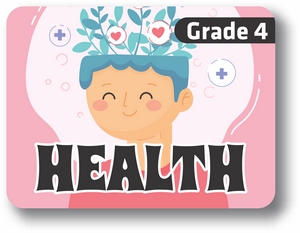Course Overview:
In 4th Grade Health, the student acquires the health information and skills necessary to become healthy adults and learn about behaviors in which they should and should not participate. Skills are taught in seeking guidance in the area of health from parents, how personal behaviors can increase or reduce health risks throughout the lifespan, how health is influenced by a variety of factors, and how to recognize health information and products. In addition to learning age-specific health information on a variety of health topics, students learn how their behaviors affect their body systems. Students are taught the consequences of unsafe behaviors while using social skills to deal with peer pressure and communicate effectively.
Required Materials:
- Paper
- Pencil
- A peer or adult to help w/ activity
- A trusted adult to be a conversation partner
Syllabus:
Module 1 - Being Healthy
Objectives:
- List the benefits of the six major nutrients in food.
- Understand food menus and labels.
- Know the difference between aerobic and anaerobic exercise.
- Understand the benefits of fitness.
- Explain how sleep is good for school work.
- Know the importance of a personal health plan.
Lessons:
- Nutrients and Food Labels
- Lesson 2 - The Importance of Fitness
Module 2 - How Our Body Works
Objectives:
- Know basic body systems.
- Understand how health decisions affect body systems.
- Understand the meaning of health information.
- Locate a variety of health resources.
Lessons:
- Body Systems
- Exploring Health Information
Module 3 - Making Good Choices
Objectives:
- Know when using prescription medication is good and not good.
- Explain similarities and differences between medications and street drugs.
- Describe the harmful effects of substances.
- Learn how to avoid drugs.
- Learn the importance of home safety.
- Know how to avoid intentional and accidental injuries.
- Identify types of abuse and how to get help from parents or trusted adults.
Lessons:
- Legal and Illegal Substances
- At-Home and Personal Safety
Module 4 - Disease and Our Communities
Objectives:
- Understand what pathogens are and how the body fights them.
- Learn how diseases are spread and prevented.
- Understand communicable and noncommunicable diseases.
- Set health goals for preventing illness.
- Know how to promote healthy communities.
- Understand the importance of a community environmental health plan.
Lessons:
- Diseases and Prevention
- Healthy Communities
Module 5 - Peer Pressure
Objectives:
- Understand peer pressure.
- Learn about positive and negative peer pressure.
- Explain why negative peer pressure needs to be handled.
- Explore ways to handle negative peer pressure.
- Understand what bullying is.
- List the three kinds of bullying.
- Learn how to handle bullying.
Lessons:
- Handling Peer Pressure
- Handling Bullying
Module 6 - How We Behave
Objectives:
- Learn how the media can impact the way we think.
- Explore how technology impacts health.
- Learn how negative media messages can be resisted.
- Know the importance of being a good role model.
- Describe the characteristics of a good friend.
- Learn how to resolve conflict in a healthy way.
Lessons:
- The Media and Health
- Being a Good Friend
Module 7 - Communication
Objectives:
- Explore the different kinds of communication.
- Learn the skills of effective communication.
- Show communication skills while speaking with others.
- Learn self-control and how to deal with emotions.
- List the steps in decision-making.
- Understand the importance of using parents and trusted adults for health decisions.
Lessons:
- Good Communication
- Problem-Solving Skills
Module 8 - Your Goals and Skills
Objectives:
- Learn the importance of goal setting.
- Know the differences between short- and long-term goals.
- Understand how parents can help us in our goal setting.
- Learn how adults are a great resource for health knowledge.
- List different social groups.
- Learn the helpful and harmful characteristics of social groups.
- Demonstrate refusal skills.
Lessons:
- Setting and Keeping Goals
- Important Issues in Health

